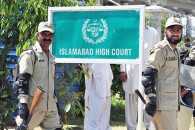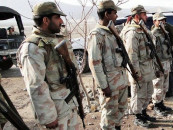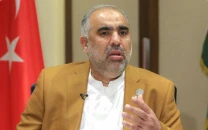Most rural Pakistanis think suicide bombers are abnormal
Parents, politicians, even Pakistani culture blamed for the rise of terrorism in the country.

Even though they attribute many rational causes for the anger and frustrations felt by terrorists, most people in rural Pakistan appear to believe that suicide bombers are mentally handicapped, according to a study of rural attitudes conducted by the University of Agriculture, Faisalabad.
According to Dr Sana Butt of the department of rural sociology at the university, more than 42% of the respondents to her survey strongly agreed with the statement: ‘Suicide attackers are abnormal in some way or mentally disturbed’, and a vast majority agreed with it.
The results of the survey are part of a study that Butt conducted titled ‘perception of rural people about suicide bombings in the context of socio-cultural ideology’.
The survey interviewed over 10,000 people in rural areas in Pakistan. Over 98% of the respondents were Muslim, and over 89% were Sunni. The survey seems to have been skewed towards younger people, with over 54% of respondents being between the ages of 18 and 28. It was also skewed towards better educated respondents, since over half of them had completed at least 10 years of schooling.
In other ways, though, the respondents seemed to be a representative sample. Over 66% lived in a household with between five and eight people, close to the Pakistani average of seven. And nearly 63% live in a joint-family system.
Over 93% of the respondents were opposed to suicide bombings, though significant majorities attributed the causes to things like social and political injustices, and even family circumstances such as overly strict parents or the household income.
About the same percentage (93%) of respondents blamed the parents of bombers for their upbringing and attitudes that result in their children becoming terrorists. Nearly 81% of those surveyed believe that suicide bombers are motivated by the demands of the movement they belong to (though it is not clear whether the respondents themselves knew what those demands were.) At least 64% thought that social status of the bomber was a determining factor in a person choosing to become a terrorist. About 53% thought that most suicide bombers were poor. A similar percentage believed they lacked formal education. Yet, 54% of respondents also thought that educated people are involved in suicide bombings at least in some capacity. And the same percentage believed that peer pressure was also to blame for people becoming terrorists.
Over 71% of those surveyed believe that parental strictness motivated people to become suicide bombers, perhaps reflecting changing attitudes about the degree to which parents should be allowed to make decisions on their children’s behalf.
An overwhelming majority (79%) believe that economic conditions create the conditions for suicide bombing, while about the same proportion (78%) believe that government ineffectiveness contributes to terrorism as well.
Interestingly, about 37% of those surveyed blamed Pakistani culture for being tolerant, or even promoting, suicide bombings. A much higher 75% blamed political leaders for instigating terrorist activity.
The survey findings suggest a nuanced, if somewhat confused, understanding of the causes of terrorism amongst rural Pakistan. Perhaps critically from the perspective of policy makers, it suggests that support for violent radicalism is still minimal. Yet, as Dr Butt pointed out, responsibility for eradicating terrorism does not lie with the government alone.
“The government alone cannot do anything against terrorist activities occurring in Pakistan,” she said. “Each and every Pakistani should try to resist terror activity by helping the police and counter-terrorism officials.”
Dr Butt, however, did not absolve the government responsibility, arguing that a concerted effort needs to be made to remove a sense of deprivation from the population, to increase respect for human rights and to end a culture of guns that allows for easy access to weapons.
Published in The Express Tribune, May 30th, 2011.



















COMMENTS
Comments are moderated and generally will be posted if they are on-topic and not abusive.
For more information, please see our Comments FAQ